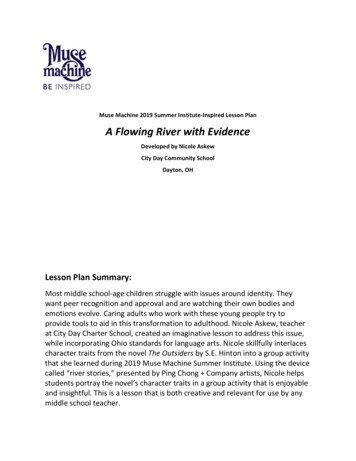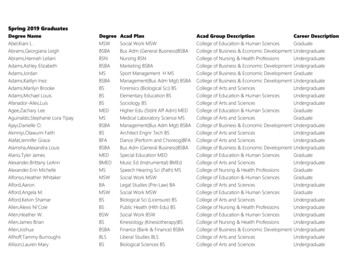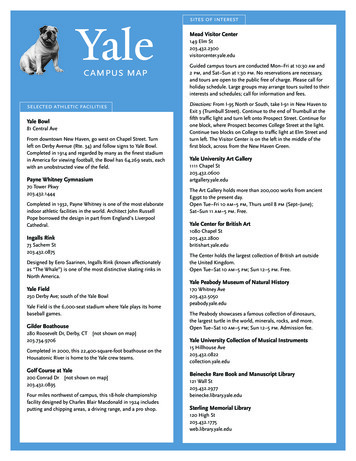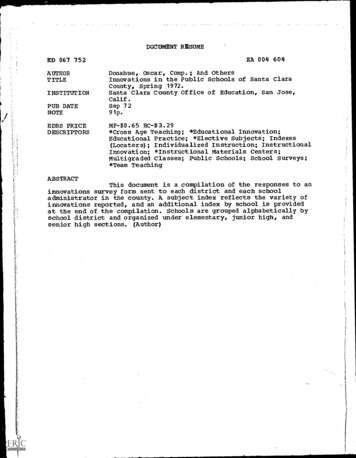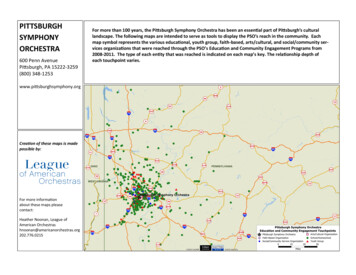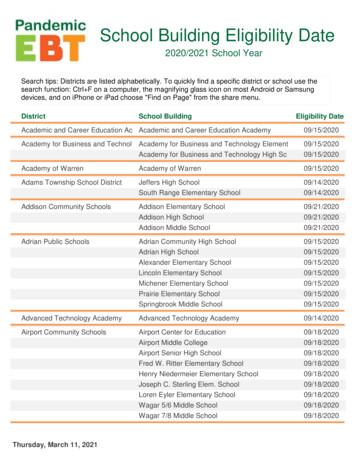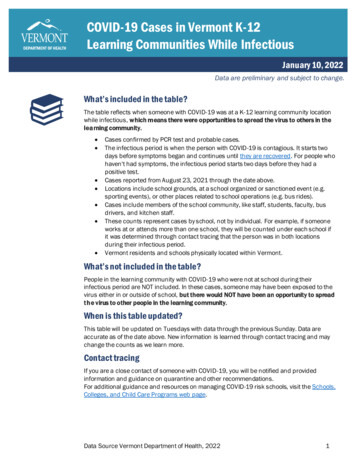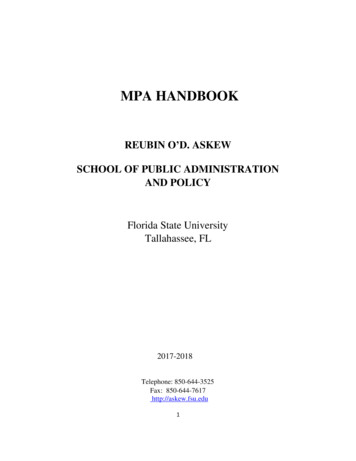
Transcription
MPA HANDBOOKREUBIN O’D. ASKEWSCHOOL OF PUBLIC ADMINISTRATIONAND POLICYFlorida State UniversityTallahassee, FL2017-2018Telephone: 850-644-3525Fax: 850-644-7617http://askew.fsu.edu1
Mission Statement“The Mission of the Master of Public Administration program is to promote ethical and competentleadership in the management of public and non-profit organizations through training that emphasizesthe integration of theory and practice, creative problem solving, integrity and stewardship, and skills inresearch and administration.”A PLEDGEThe Askew School exists to prepare students to exercise positions of responsibility inservice to the public. In doing so, we seek to live up to the values and ideals of a democraticsociety. In a diverse nation and world, this means a commitment to such values as respect forothers and an abiding commitment to the democratic process. We subscribe to the policy of theuniversity which states, in part: "The Florida State University is committed to nondiscriminationbased on race, creed, color, sex, religion, national origin, age, disability, and status relative toVietnam era veterans. This commitment applies in all areas to applicants, visitors, students,faculty, administrators, staff, and others who are affiliated with the university."2
TABLE OF CONTENTSIntroduction.4Program Goals .4Admissions.5Transfer of Credit.5Financial Aid.6Advising .7Degree Requirements .7Prerequisites and Sequencing of Required Courses.8Electives .9Certificate Programs and Non-Degree Seeking Student Status .10Joint Degree Programs and the Ph.D. Program .11Course Loads, Dropping Classes, and Withdrawal from the University .11Bypassing Core Courses .12Directed Individual Study .12Mid-program Review .13Internship .13Action Report .14Graduation Procedure . . . .14Career Placement .14The Student Conduct Code .15Equal Opportunity, Disabilities, and Sexual Harassment .16PAGA, Pi Alpha Alpha, and ASPA Membership .16Listserv, Mail Center, Newsletter . .17Help Centers . .17Appendix I:Electives & Career Paths . . .18Appendix II: MPA Student Advising Sheet . . 28Appendix III: Selected Courses: Frequency . . .29Appendix IV: Sexual Harassment Statement . . .31Appendix V: Action Report Problem Statement Checklist .33Appendix VI: Action Report Initial Proposal Checklist .34Appendix VII: Writing Guide . . . .36Appendix VIII: Questions and Answers About the Program . .393
IntroductionThe Master of Public Administration (MPA) degree at Florida State is one of the oldestin the nation. Public administration courses have been taught on campus since the 1930’swhen Florida State enrolled only women, and women were the first MPA recipients. TheSchool of Public Administration was founded in 1947, and was renamed as the ReubinO’D. Askew School of Public Administration and Policy on April 22, 1994. This changewas made to honor the former governor and ambassador, who was one of our alumni andlater served as a member of the faculty. Governor Askew was designated as one of theten outstanding governors nationally in the past century, and his commitment to highethical standards in public service is one that the School seeks to perpetuate.The FSU degree was one of the first to be accredited and continues to be fully accreditedby the Network of Schools of Public Affairs and Administration (NASPAA). Theprogram regularly receives commendations from its accreditation reviews. There are noofficial rankings of the over 250 public administration programs in the United States, butFlorida State has consistently been ranked among the top 10% in unofficial polls. In the2016 US News survey, the Askew School was ranked 19th. In a 2004 study of scholarlyproductivity in refereed journals, the School ranked fourth in the United States. TheSchool ranked third for student-authored publication output. A 2014 study ranked theSchool third in the world for faculty publication productivity.Program GoalsThe MPA is the professional degree for the practice of public administration. Theprogram prepares students for positions in government and nonprofit organizations, butsome graduates go on to successful careers. Equal emphasis is placed upon twocategories of students: in-service students who wish to improve their capabilities andcareer potential and pre-service students who seek to enter the public service andeventually rise into managerial positions.The faculty have identified the following list of competencies central to the program. Itis the goal to help students to achieve these competencies.1. Know how to apply concepts of ethics in policy and the management of publicorganizations;2. Develop and demonstrate excellent skills in oral and written communication, theanalysis and communication of complex information;3. Understand how to lead people, especially in teams, and to work with citizens;4. Demonstrate an understanding of the primary tools, events, participants, contexts andinstitutions in public policy and management;5. Learn how to work effectively in collaborative policy and program networks acrosssectors and governments;6. Comprehend policy development, implementation and management of the policyprocess, oriented to societal goals and benefits;4
7. Recognize different ways of viewing organizations, and methods for improvingorganizational performance in managing public and nonprofit organizations.AdmissionsOur objective is to select a diverse group of students with academic ability and careerpotential who are committed to public service. MPA candidates seeking regularadmission must meet the University's quantitative standards (a grade point average of atleast 3.0 on all upper division work and scores on the Graduate Record Examination orother approved test such as the GMAT), furnish letters of recommendation (including twofrom professors for recent students), and prepare a career goal statement.If students meet the minimum university admission requirements but their recordsindicate some weakness in preparation, provisional admission may be granted. Theprovisions may include special requirements for additional diagnostic work to enhancechances of success and/or specific particular performance requirements for the firstsemester.A very limited number of exceptions to the minimal university requirements are availableon a competitive basis with attention given to affirmative action. Students who do notmeet minimum qualifications may attempt to prove their ability to do graduate work byenrolling as non-degree seeking "special students" (consult University Bulletin).Those who try this route to admission should enroll in PAD 5050, 5700, and one othercore course, and have a cumulative grade point average of at least 3.0 for allgraduate work.Applicants are forewarned, however, that successful performance as anon-degree seeking student does not assure admission. If a candidate does not gainadmission, he or she may pursue one of the graduate certificate programs. A limit oftwelve credit hours taken as a non-degree seeking student can be transferred into theprogram if the individual is admitted.Transfer of CreditTransfer of course credits from another graduate school is normally limited to ninesemester hours of recent courses. Students should submit appropriate information, such asa course syllabus, to the MPA director for approval. Students must seek prior approval ifthey plan to take a class elsewhere and apply it to the degree.Financial AidThe School offers a few graduate assistantships and scholarships. Recipients are chosenon a merit basis. This assistance is awarded beginning in the Fall semester. To beassured of consideration for all possible awards, applications for the next fall should bereceived by mid-March. Assistantships include a tuition waiver and a stipend forapproximately 1/4 or 1/3 time service (approximately 10 to 15 hours per week). Students5
may be assigned as research or administrative assistants. New students with especiallystrong undergraduate grades and GRE scores may apply for the few very competitiveUniversity Fellowships through the School before January 10th (fellowships include anout-of-state tuition waiver) for the following fall semester.Other fellowship opportunities are announced throughout the year. The Graduate Schoolmaintains current information about sources of financial aid on their website at:http://gradschool.fsu.edu/funding-awards. Application forms for loans and financialassistance may be obtained from the Office of Financial Aid (http://financialaid.fsu.edu).In addition, the Division of Student Affairs has information on assistantships availableelsewhere in the university.The University offers a number of programs for economically disadvantaged students.The deadlines are typically early January, and require separate applications. Thosequalified are encouraged to apply simultaneously for one or more of the following:1. The Auzenne/Wilson Assistantship program for Black graduate students offersstipend which may be supplemented by the Askew School (early January).2. The FAMU Feeder Fellowship for Black graduate students provides supportwhich may be supplemented by the School (early February).The University administers a full array of general support programs. Students shouldapply far in advance to the Office of Financial Aid. Students receiving aid through theCollege Work/Study Program may request assignment to the School where the workexperience can be designed to complement academic interests. To obtain aid, register forat least six hours of coursework (some sources require nine or 12 hours). Federal lawschange concerning how financial aid affects income taxes. Check with the Financial AidOffice for current information, and consult the IRS web site for information aboutLifetime Learning Tax Credit to possibly reduce tax liability. Apply for, or renew,financial aid each academic year, usually in late spring (even if you already receiveaid) at http://studentaid.ed.gov/InternshipsMany students obtain internships while in the program. Agencies usually expect studentsto have at least a semester of course work. The most selective internships are those in theFlorida House and Senate and Office of the Governor (consult their web sites for details;applications are normally due early in each calendar year). Some students enter theprogram while working part-time in non-professional jobs and then may move into paidforms of employment while completing coursework.AdvisingWhen admitted, students are automatically assigned a faculty adviser. Students shouldmake an appointment to see their designated member prior to their initial registration.After that time, students may ask a faculty member in their area of interest to serve as6
their adviser. The initial assignment is intended to help students get started; afterwards itis best to seek advice from the faculty members who are listed within the career path(s)that best fit your goals. Any member of the faculty can sign any student’s advising form.Each time you meet with a faculty adviser about course selections, bring a completed"MPA Student Advising Form" (in Appendix II). It shows your program of study -- whatyou have taken and what you plan to take, as well as other information of importance. Ifyou have not yet completed the form, then do so prior to your next meeting with anadviser. For subsequent advising sessions, print a new copy – fill it out prior to meetingwith the faculty member. After the adviser signs the updated form, give it to theCoordinator for Academic Support (Ms. Velda Williams) to be placed in your file. It isessential that there is a current signed program of study, as this is used for the graduationcheck to assure that each student has met the graduation requirements.The MPA Director is the secondary adviser for students. The Director makes decisionsregarding such things as whether an internship will be required and offers advice aboutelectives and career placement. The faculty are experienced in both the practice andteaching of public administration and policy. To "get your money's worth" and seekadvice from several faculty members. The School offers electives that help studentspursue their choice from several career paths. We also encourage students to fashionelectives in a way that best fits their expected individual career aspirations, so long as thisis done with prior faculty advice.Degree RequirementsRequirements include completion of eight required courses and six elective courses for aminimum of 42 semester hours (24 hours of required credits and 18 hours of electivecredits). The university "Recency of Work" requirement stipulates that all courses must becompleted in seven years. The required courses include a substantive core of five courses,a two-course methodology sequence and an applied research project called the ActionReport (see below).Successful completion of the required courses (the core courses, methodology courses,and the Action Report) is defined as a grade of B- or better. Students who receive gradesof C or less in any required courses must repeat them. If grades of C are received inelective courses, the courses need not be repeated if the overall grade point averageremains at or above a 3.0. Students who lack one year of full-time professional experiencemust take the internship class (PAD 5946) for an additional three (3) credit hours.All those who have more than a year of full-time professional work experience, defined asa job requiring a BA degree (and totaling some 2,000 work hours), are eligible for awaiver. The jobs students hold during their master’s program can count towards thewaiver, and more than one job can be used to compile the year’s work experience. Formore, see the internship section.The program enables students to choose from the university's resources in a way that bestfits their career aspirations. To assist students in choosing elective courses, this Handbook7
includes groupings of elective courses that best fit each of several career paths (seeAppendix I). Be sure to get advice from faculty members before choosing elective courses.Core Courses (15 hours)PAD 5050PAD 5106PAD 5227PAD 5417PAD 5035The Profession of Public AdministrationPublic OrganizationsPublic Financial ManagementHuman Resource ManagementPolicy Development and AdministrationMethodology Sequence (6 hours)PAD 5700 Research Design in Public AdministrationPAD 5701 Quantitative Analysis in Public AdministrationInternship (3 hours if less than one-year, full-time professional work experience).PAD 5946 InternshipApplied Research Project (3 hours)PAD 6908 Action ReportElectives (18 hours)Prerequisites and Sequencing of Required CoursesStudents may begin in any term. Schedule PAD 5050 and PAD 5700 during the firstsemester. PAD 5700 is a prerequisite for PAD 5701 which should be taken the followingterm. PAD 5035 should be taken immediately after PAD 5701 and before taking PAD6908. This sequencing is designed to help students to develop research and writing skills.For most students not on an assistantship, four courses is a full-load. For those onfellowship, a full-time load is three courses. Students who work full time should notattempt more than six credits per term. The following schedule lists an appropriatesequence of courses for a program of study that spans five semesters:First Semester:PAD 5050 Profession of Public AdministrationPAD 5700 Research DesignOne (or two) elective course(s)Second Semester:PAD 5701 Research MethodsOne core courseOne (or two) elective course(s)Third Semester:PAD 5035 Policy Development and Management8
Internship or in fourth semester (if required)One core courseOne elective courseFourth Semester:One core courseTwo elective coursesFifth Semester:PAD 6908 Action ReportOne elective courseMost core courses are offered every semester, including summer sessions. Electivecourses are taught usually once a year and occasionally only every four or five semesters,so watch for those classes. To be ready to take electives in a particular career path, takethe core course of that topic area as soon as possible to have the prerequisite for anadvanced course (e.g., take PAD 5227 before PAD 6226 or PAD 6207). During thesummer semester, most core classes, but only a few elective courses, are offered. There isalso a limited course offering in other departments. Students who plan to enroll in thesummer should plan to “save” one or more of the core classes to take at that time.Electives and Career PathsThe School expects each student to take a coherent set of elective courses that enhancestheir abilities and future prospects for public service careers. A career in publicadministration typically begins in specialized positions and progresses toward higher levelpositions in which generalist, leadership-oriented capacities are of greater importance.Since students may take six electives, there is great flexibility in designing a course ofstudy.To assist students in selecting the electives that best fit career paths, the School hasassembled lists of courses that are well suited for each of several career paths. Courses forthe following possible career directions are included in Appendix 1: Local Government Management Leadership and Strategic Management Public Financial Management Managing Nonprofit Organizations Policy Analysis and Evaluation Methods Emergency Management International and Non-Governmental Organizations.The majority of MPA students take their electives within one of these paths. Othersindividually select electives that best fit their own intended career. This often involvesmixing electives from two or more of the lists. We encourage individual tailoring ofelectives to best fit personal goals; be sure to get faculty advice before doing so. Mostexperienced students possess specialized knowledge and skills. A wide range of electivesis often best for those who have several years of experience. The career path in leadership9
and strategic management is especially appropriate for experienced students who wish toprepare themselves for executive positions.Pre-service students, those without practitioner experience, are encouraged to focus onone of the indicated paths. Most inexperienced students enter the program with generalliberal arts degrees. Those degrees are valuable because they provide important insightsinto social problems, values, and human behavior. Pre-service students, however,generally need some specialized knowledge and skills to begin their careers. Several ofthe career trajectories include courses designed to provide this knowledge.An advantage of a large diverse institution like Florida State is that it offers many coursesrelevant to public service careers. Reflecting our location in the capital city of a “megastate," many departments across the university include policy-related studies in theircurricula. Students may enroll for six hours of elective coursework in another departmenton a pass/fail basis. This may be advisable when taking elective courses in other fieldswhere MPA students might be in competition with those who have had years ofpreparation in that discipline. Any course taken from the School of Law should be takenon the S/U basis as that School follows a different basis for determining grades. Publicadministration courses, however, may not be taken on the S/U basis.CertificatesStudents may choose to use their electives courses to work toward completing one of thegraduate-level certificates that the School offers. The certificates are not a part of theMPA program and they may be obtained by persons who have not been admitted to thegraduate school. Most MPA students do not choose to obtain a certificate in addition tothe degree. For inexperienced students, completing a certificate does show that thestudent has attained a higher level of competency in an area.The graduate-level certificates that the School offers are: General Public AdministrationFinancial ManagementEmergency ManagementFlorida City and County ManagementCivic and Nonprofit Leadership (awaiting final approval from the university)Non-Degree Seeking Student StatusStudents may obtain the graduate-level certificates as non-degree seeking student (thosewith bachelor degrees who take graduate courses without being admitted to graduatestanding). Individuals who take classes as non-degree seeking students may only use (ortransfer into a degree program) 12 semester hours as a non-degree seeking student towarda graduate degree. Some students who do not qualify for regular admission take coursesas non-degree seeking students in hopes of proving their ability to do graduate work. Suchstudents are cautioned that success as a special student cannot guarantee admission. The10
School is strictly limited in the number of students it can admit who do not fully qualifyfor admission as degree seeking students (see "Admissions" above).Joint Degree Programs and the Public Administration Ph.D. ProgramJoint degrees with Urban and Regional Planning, Social Work, Criminology and CriminalJustice, and the College of Law are available (to be eligible for the joint J.D./M.P.A. orJuris Master/M.P.A. degrees, a student must be admitted to the School of Law; admissionto graduate standing in other programs does not constitute admission to the School ofLaw). Students should first apply to one of the programs to obtain admission to thegraduate school and then petition the sister program for acceptance into a joint degreestatus.Acceptance by both programs is required for students to seek joint degrees. Students mustapply for the joint degree before completing 24 hours of graduate credit in one of theprograms. For further details, interested persons should contact their adviser. Onlinedescriptions outline the requirements for joint degrees (a link to these descriptions isavailable on the School’s website). In joint degree programs, students complete all ornearly all of each degree's core courses, take research methods courses from onedepartment, a single internship that meets both degrees’ requirements, and fewerelectives. The joint degrees reduce the time required to obtain the two degrees by as muchas two terms of study, when compared to doing the two degrees separately.The Askew School also offers a Doctor of Philosophy degree. The doctorate is a researchoriented degree, intended to prepare persons for careers in academia or in other positionsthat require advanced research skills and theoretically advanced knowledge. In publicadministration, the MPA is recognized as the primary degree for practice. The attainmentof the MPA does not assure admission. Admission to the doctoral program requires atleast a 3.5 graduate grade point average in addition to other qualifications. It is possiblefor persons who possess a baccalaureate to be directly admitted to the Ph.D. program.Students who do so must satisfy most of the MPA requirements en route to the Ph.D.;there is little reason for them not to obtain the master’s degree as well. Interestedindividuals should consult with the MPA and Ph.D. directors.Course Loads, Dropping Classes, and University WithdrawalSome students attempt too many courses at one time. We recognize that many are underfinancial and other pressure to obtain their degree as soon as possible, but students whoattempt to do too much may hurt themselves, their career potential, and their academicrecord.The Graduate Bulletin states that 12 credits per semester constitute a full-time load. Noone should exceed this; it is a very heavy load. The degree is designed for two academicyears of full time study, including summers. Those completing it on a part-time basisshould expect to spend three or more years in doing so. No student working 30 or more11
hours per week should attempt more than six credits per term until he or she is wellestablished in graduate work.During the first four days of classes, individual courses may be added or dropped.Students are financially liable for all courses that remain on their schedule. Courses mayroutinely be dropped through the seventh week of classes; however, tuition charges willremain. Courses dropped during this period will not appear on the student’s transcript.After the seventh week of classes, courses may be dropped only with the approval of theMPA Director and the Associate Dean. These courses will appear on the student’stranscript with the notation “WD." It is recognized that professional and personalproblems do arise, and we attempt to be responsive to these problems. We also believethat attempting to withdraw from courses when students have not diligently appliedthemselves is indicative of unprofessional behavior. Students who register for courses butwho do not attend the classes will receive grades of "F" if the courses are not officiallydropped.Students must obtain permission from the MPA Director to withdraw from the university.Failure to register for courses for two consecutive terms, including either the Fall orSpring semester, constitutes an automatic withdrawal and requires readmission.Readmission is restricted to those who have maintained a 3.0 average. If problems of awork, personal, or academic nature occur that interfere with performance, see theDirector.Bypassing Core CoursesStudents who enter the program having taken prior undergraduate coursework in publicadministration may bypass PAD 5050 Profession or PAD 5227 Financial Resourcesif they have completed at least two appropriate undergraduate courses with a grade of Aand have been reviewed by the MPA director as well as by a faculty member responsiblefor the course.To bypass PAD 5227, one of the undergraduate courses must have been in publicbudgeting (and include an introduction to financial administration). Students who receivea bypass should take an intermediate course in the same general topic, or an elective inpublic administration if PAD 5050 is bypassed.A bypass does not reduce the total credits for a degree (it is not a waiver), but allowsstudents to better fit course selections to their level of knowledge. Those who have takengraduate coursework at other institutions should consult the section of this Handbook thatdeals with transfer credits.Directed Independent StudyStudents may undertake individual study through Directed Independent Study (DIS).Such studies are not intended to substitute for scheduled courses. Students may register12
for a DIS (PAD 5907-section number) after completing twelve semester hours in the coreand methodology courses. Prior to registration, the person must talk to the professor s/heis interested in working with to get their agreement to oversee the tutorial project. There isno scheduled class meeting time. A student is limited to nine hours of DIS S/U credits.Individuals should have a reasonably complete idea of what he or she wishes toaccomplish before requesting a conference with a faculty member. FSU regulationsrequire one conference a week to be scheduled on campus; equivalent forms of studentfaculty interaction may be substituted. Other than the opportunity to work on a project ofmutual interest, there is minimal incentive for a professor to direct a tutorial. Students,therefore, should be prepared to convince him or her of the merits of their proposal. Thestudent is responsible for completing and returning the appropriate university form to theMPA office.Mid-program ReviewUpon completion of approximately 15-18 hours of coursework, each student’s progresswill be reviewed by the faculty. The review examines academic achievement, progresstoward degree, internship completion, and selection of elective courses. Students areencouraged to consult with their adviser to give consideration to potential Action Reporttopics. Each student receives an assessment in writing.InternshipIn a
The Master of Public Administration (MPA) degree at Florida State is one of the oldest in the nation. Public administration courses have been taught on campus since the 1930's when Florida State enrolled only women, and women were the first MPA recipients. The School of Public Administration was founded in 1947, and was renamed as the Reubin
